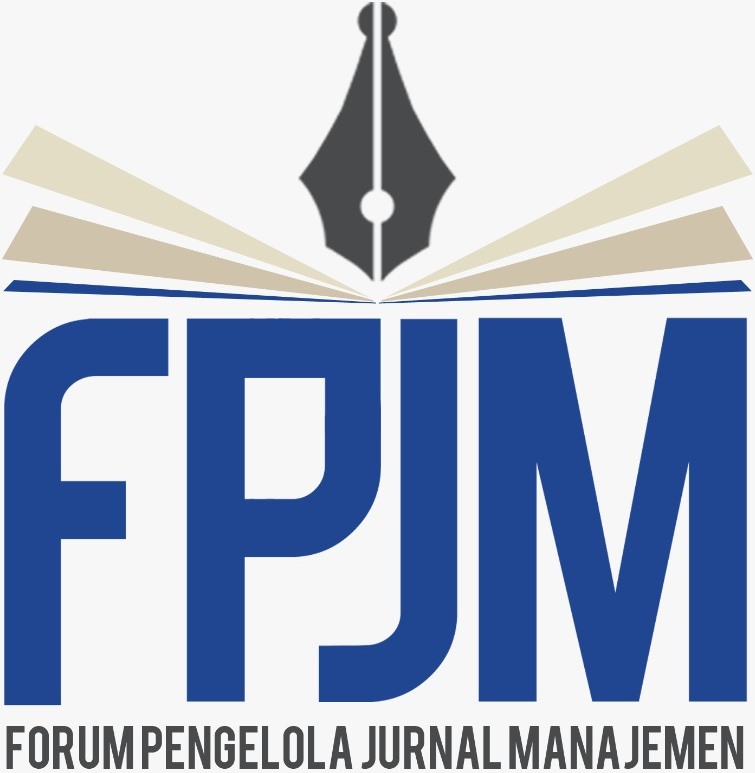BUDAYA ORGANISASI DAN EFEKTIVITAS KOMUNIKASI ANTARPRIBADI SEBAGAI PREDIKTOR KOMITMEN TERHADAP ORGANISASI
Abstract
The research objective was to determine the factors related to commitment to the organization to increase Commitment to the Organization in the research on organizational culture factors and the effectiveness of interpersonal communication. The research was conducted on permanent employees of the Directorate of Human Resources and General Affairs, LPP RRI Headquarters, Jakarta, Indonesia. The research sample consisted of 66 permanent employees who were taken randomly from the population. This research mainly uses quantitative data (from questionnaires). Regression analysis is used to measure the influence between variables. The results showed that organizational culture had a positive and significant effect on organizational commitment. Likewise, interpersonal communication has a positive influence on commitment to the profession. Based on the results of this study, there are several recommendations to the Directorate of Human Resources and General Affairs of the LPP RRI Head Office, Jakarta to increase the commitment of employees of the organization.
Keywords
References
Allen N. J dan Meyer J. P. (1990). The Measurement and Antecedents of Affective, Continuance, and Normative Commitment to The Organization. Journal of Occupational Psychology, 63, 1-18. http://dx.doi.org/10.1111/j.2044-8325.1990.tb00506.x.
Azizollah, dkk. (2015). The Relationship Between Organizational Culture and Organizational Commitment in Zahedan University of Medical Sciences. Glob J Health 8(7), 195-202. 10.5539/gjhs.v8n7.195.
Bentein, K., dkk. (2005) The Role of Change in The Relationship Between Commitment and Turnover: A Latent Growth Modeling Approach. Journal of Applied Psychology. 90(3), 468-482.
Colquitt, dkk. (2010) Organizational Behavior: Improving Performance and Commitment in The Workplace. New York: McGraw-Hill.
Ghozali, I. (2002). Aplikasi Analisis Multivariat dengan Program SPSS. Semarang: Badan Penerbit Univ. Diponegoro.
Handoko, T. H. (2007). Manajemen. Yogyakarta: BPFE.
Lok, P. dan Crawford, J. (2004). The Effect of organizational Culture and Leadership Style on Job Satisfaction and Organisational Commitment: A crossâ€National Comparison. Journal of Management Development, 23(4), 321-338. https://doi.org/10.1108/02621710410529785.
Luthans F, dkk. (1985). Organizational Commitment: A Comparison of American, Japanese, and Korean Employees. The Academy of Management Journal; 28(1), 213-219. http://dx.doi.org/10.2307/256069.
Meyer, J. P. dan Allen N. J. A. (1991). Three Component Conceptualization of Organizational Commitment. Human Resource Management Review, 1(1),6189. http://dx.doi.org/10.1016/1053-4822(91)90011-Z.
________ dan Herscovitch, L. (2001). Commitment in the workplace: Toward a general model. Human Resource Management Review, 11, 299-326. http://dx.doi.org/10.1016/S1053-4822(00)00053-X.
_________, dkk. (2002). Affective, Continuance, and Normative Commitment to The Organization: A Meta-analysis of Antecedents, Correlates, and Consequences. Journal of Vocational Behavior, 61, 20-52. http://dx.doi.org/10.1006/jvbe.2001.1842.
Miller, D. (1983). The Correlates of Entrepreneurship in Three Types of Firms. Management Science, 27, 770-791.
Peraturan Direksi Lembaga Penyiaran Publik Radio Republik Indonesia Nomor 01 PERDIREKSI. (2011) Struktur Organisasi Tata Kerja Radio Republik Indonesia. Jakarta
Peraturan Presiden Republik Indonesia Nomor 12 Tahun 2005 tentang Lembaga Penyiaran Publik Radio Republik Indonesia.
Permana, G. P. (2013). Hubungan Budaya Organisasi dengan Komitmen Organisasional Pada Karyawan Divisi Consumer Cards Group PT Bank Mandiri Plaza Bapindo. Jurnal Ilmu Administrasi Niaga, Fakultas Ilmu Sosial dan Ilmu Politik, Universitas Indonesia.
Porter L. W., dkk. (1974). Organizational Commitment, Job Satisfaction, and Turnover Among Psychiatric Technicians. Journal of Applied Psychology, 59, 603-609. http://dx.doi.org/10.1037/h0037335.
Rakhmat, J. (2000) Psikologi Komunikasi. Bandung: Remaja Rosdakarya,
Robbins, S. P. dan Coulter, M. (2012). Perilaku Organisasi. Edisi 12. Jakarta: Salemba Empat.
Robbins, S. P. dan Judge, T. A. (2008). Perilaku Organisasi. Edisi ke 12. Jakarta: Salemba Empat.
Rue, L. W. dan Byars, L. L. (2007). Supervision Key Link to Productivity. NY: McGraw-Hill International Edition.
Sopiah. (2008). Perilaku Organisasional. Yogyakarta: CV Andi Offset.
Syaekhu, A. (2018). Effect of Personality and Interpersonal Communication on Organizational Commitment. Jurnal Penelitian dan Pemikiran Administrasi Publik; Vol 8, No. 1.
Wegner dan Hollenbeck. (2010). Organizational Behavior. New York: Taylor Francis.
Wibowo. (2010). Manajemen Kinerja. Jakarta: Rajawali Press.
Widjaya, A.W. (2002). Komunikasi dan Hubungan Masyarakat. Jakarta: Bumi Aksara.
DOI: 10.34203/jimfe.v6i2.2412
Refbacks
- There are currently no refbacks.
Copyright (c) 2020 JIMFE (Jurnal Ilmiah Manajemen Fakultas Ekonomi)

This work is licensed under a Creative Commons Attribution-NonCommercial-ShareAlike 4.0 International License.











